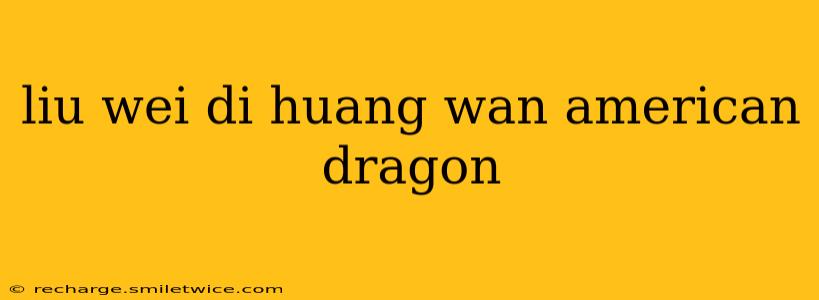Liu Wei Di Huang Wan (六味地黄丸), often shortened to LWDHW, is a classic formula in Traditional Chinese Medicine (TCM) renowned for its ability to nourish the kidneys and support overall health. While its use is widespread in Asia, its increasing popularity in the West, particularly amongst those seeking alternative therapies, warrants a deeper understanding. This article will explore Liu Wei Di Huang Wan, addressing common questions and providing a comprehensive overview of its uses, benefits, and potential side effects.
What is Liu Wei Di Huang Wan used for?
Liu Wei Di Huang Wan is primarily used to tonify the kidneys, which in TCM theory, are responsible for much more than just urinary function. Kidney deficiency, according to TCM, can manifest in a variety of symptoms, including:
- Fatigue and weakness: A common sign of kidney deficiency is persistent tiredness and lack of energy.
- Low back pain: Pain in the lower back is often associated with kidney weakness.
- Frequent urination: Especially at night (nocturia).
- Tinnitus (ringing in the ears): This is often linked to kidney yin deficiency.
- Vertigo (dizziness): Another symptom related to kidney yin deficiency.
- Premature aging: TCM associates kidney health with longevity and overall vitality.
- Sexual dysfunction: In both men and women.
- Dry skin and hair: These are often indicators of kidney yin deficiency.
LWDHW aims to address these symptoms by nourishing and strengthening the kidneys, restoring balance and promoting overall well-being. It's important to note that these are symptoms within the context of TCM, and may not align perfectly with Western medical diagnoses.
What are the ingredients in Liu Wei Di Huang Wan?
Liu Wei Di Huang Wan derives its name from its six key ingredients:
- Rehmannia root (熟地黄): A key ingredient known for its nourishing properties. The “cooked” version (Shudihuang) is used in LWDHW.
- Cornus fruit (山茱萸): Supports kidney function and essence.
- Moutan root bark (牡丹皮): Helps to cool the blood and reduce inflammation.
- Alisma rhizome (泽泻): Promotes diuresis (urination) and helps to eliminate excess moisture.
- Poria cocos (茯苓): A fungus known for its diuretic and calming effects.
- Chinese yam (山药): Nourishes the spleen and the kidneys.
These ingredients work synergistically to achieve the overall therapeutic effect. The precise ratios of each ingredient are crucial for the formula's efficacy.
Is Liu Wei Di Huang Wan safe?
Generally, Liu Wei Di Huang Wan is considered safe when taken as directed. However, like any herbal remedy, potential side effects exist. These may include mild gastrointestinal upset such as nausea or diarrhea. It’s crucial to purchase LWDHW from reputable sources to ensure quality and purity. Individuals with specific health conditions or those taking other medications should consult a qualified healthcare professional or a licensed practitioner of Traditional Chinese Medicine before using LWDHW.
Who should not take Liu Wei Di Huang Wan?
Individuals with certain conditions should exercise caution or avoid LWDHW altogether. These include those with:
- Cold or damp conditions: LWDHW is generally not suitable for individuals with excess cold or dampness in the body.
- Hot flashes and night sweats: The formula might exacerbate these symptoms in some individuals.
- Pregnancy and breastfeeding: Further research is needed to establish safety during pregnancy and breastfeeding.
- Allergic reactions: Individuals with known allergies to any of the ingredients should avoid its use.
How do I take Liu Wei Di Huang Wan?
Dosage varies depending on the individual and the specific formulation. It is essential to follow the instructions provided by the manufacturer or your healthcare professional. Typically, it’s taken once or twice daily.
Where can I buy Liu Wei Di Huang Wan?
LWDHW is widely available online and in Asian grocery stores or specialized health food stores that carry TCM products. It's important to purchase from reputable suppliers to ensure product quality and authenticity. However, remember to consult with a qualified healthcare professional before beginning any new herbal supplement regime.
Disclaimer: This information is for educational purposes only and is not intended as medical advice. Always consult a qualified healthcare professional before starting any new supplement or herbal remedy, especially if you have pre-existing health conditions or are taking other medications. This is not a substitute for professional medical advice.
